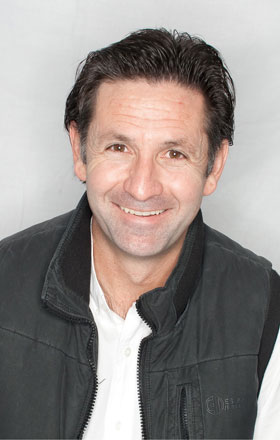
Here they are, TechCentral’s South African Newsmakers of 2014. These are the individuals, in ascending order from five to one, who we believe were the most newsworthy in the technology and telecommunications space this year, for good reasons and bad.
Also, check out our International Newsmakers of 2014, published earlier this week.

 Marcel Golding and Bronwyn Keene-Young
Marcel Golding and Bronwyn Keene-Young
E.tv CEO Marcel Golding resigned in October following his suspension as executive chairman of e.tv parent Hosken Consolidated Investments (HCI) in a boardroom battle with his longstanding business partner, John Copelyn.
HCI accused Golding of unauthorised share trading, saying he did not have board approval to purchase R24m worth of shares in technology company Ellies.
Golding appealed his suspension in the labour court, but lost the application. He claimed he was being ousted in a battle over e.tv’s editorial independence, something HCI denied.
In the same week, Golding’s wife, Bronwyn Keene-Young, who was chief operating officer at e.tv and its immediate parent Sabido, also resigned with a strongly worded letter slamming Copelyn. The letter exposed the extent of the breakdown in relations between Copelyn and Golding, who together founded the free-to-air broadcaster.
In Golding’s defence, former cabinet minister Barbara Hogan also tendered her resignation from the HCI board, saying she was “uneasy with the proposition that the discontent with Marcel’s leadership can solely be attributed to the alleged unauthorised trading in Ellies shares”.
In her resignation letter, Keene-Young said Copelyn failed to explain that he was “fully aware of the ‘Ellies shares’ matter and he did nothing about it until “all other attempts and threats to get Marcel to resign had failed”. — RvdB

 Zandile Tshabalala and Hlaudi Motsoeneng
Zandile Tshabalala and Hlaudi Motsoeneng
The terrible twosome installed at the top of the broadcasting studios in Auckland Park were hardly out of the news all through 2014. And for all the wrong reasons.
SABC chair Zandile Tshabalala has spent the past few months dodging a parliamentary inquiry into whether or not she has a the qualifications she claimed she did when she was appointed. Unisa insists she doesn’t; she says she does but refuses to produce the evidence.
A multiparty parliamentary committee has now recommended she be removed from office after finding her guilty on two charges of misconduct. She’s now taking the matter to court.
All through 2014, Tshabalala continued to defend the SABC’s chief operating officer, Hlaudi Motsoeneng, who has proved even more controversial than the chair of the board.
In October, the Western Cape high court ordered that the SABC must suspend Motsoeneng and start a disciplinary process against him. This followed an application by the Democratic Alliance asking for an urgent interim interdict to have him suspended pending a review of the decision to appoint him as permanent head of operations.
Motsoeneng has now vowed to fight the matter all the way to the constitutional court if necessary.
In February, the public protector, Thuli Madonsela, released a damning report on corporate governance at the SABC and recommended that a chief operating officer be appointed within 90 days. In the report, Madonsela found among other things that he misrepresented his matric qualifications to the SABC. — DM

 Sipho Maseko and Brian Armstrong
Sipho Maseko and Brian Armstrong
With a share price up by nearly 500% since he took the reins a little over 18 months ago, Telkom CEO Sipho Maseko and his lieutenant, chief operating officer Brian Armstrong, are obvious candidates for our list of newsmakers. It’s not only investors who are excited about what the pair are doing, though. The company is finally focusing on its strengths rather than wasting money on costly side projects like expanding into foreign markets.
It’s realised it’s monopoly over telecommunications in South Africa is all but gone and it’s starting to box clever against its competition. In Parkhurst and Parkview in Johannesburg, for example, it abandoned plans to deploy fibre to the home after residents chose alternative providers. Instead, it’s deploying LTE-Advanced in those areas using its extensive spectrum assets, in the process muddying the waters for the upstart fibre competitors.
Belatedly, Telkom also appears to have realised that it must work with Internet service providers to grow its fixed-line broadband business. It’s decision to open its fibre-to-the-home network on an open-access basis to ISPs demonstrates this changing in thinking.
The company still has a long way to go. It’s future success depends on its offering consumers a quad-play of services, including voice-over-Internet protocol telephony, television entertainment, and fixed broadband and wireless services. And it needs to do so at competitive prices, which means further cuts to unnecessary expenses (probably including further layoffs) while ensuring it maintains capital expenditure at a level that ensures it doesn’t cede too much of the fixed-line market to its rivals in the years ahead. — DM

 Kim Reid
Kim Reid
When online retailer Takealot.com disclosed back in May that it had raised US$100m (more than R1bn) from its controlling shareholder Tiger Global Management, it was clear that the company was going to shake up the e-retail business in South Africa.
That’s happened with remarkable speed. Just five months after the Tiger deal was announced, Takealot dropped the bombshell that it was to merge with Naspers-owned rival Kalahari.com in an effort to create an e-commerce giant in South Africa capable of taking on big bricks-and-mortar competitors and international e-commerce competittors.
The man leading this change and consolidation is Kim Reid, a former Naspers executive and now CEO of Takealot. As far back as 2011, Reid has been promising to build Takealot into a R1bn-revenue business. The merged Takealot-Kalahari entity will simply be named Takealot, providing insight into which side is driving this consolidation.
But what is Reid’s endgame here? Could he be dressing up Takealot in the hopes that a big international e-commerce retailer — Amazon, say — will buy it and use it as its vehicle into Africa. Amazon CEO Jeff Bezos must surely have a plan for the continent. Could Takealot be it? — DM

 Ryan Hawthorne and Niel Schoeman
Ryan Hawthorne and Niel Schoeman
There was much debate in the TechCentral offices about whether to make Takealot’s Kim Reid or these two gentlemen our newsmakers of the year. Parkhurst resident Ryan Hawthorne and Niel Schoeman, CEO of telecommunications start-up Vumatel, have, however, squeaked into top place for their pioneering work on bringing fibre to the home in South Africa.
The story is well known by now: fed by poor Telkom broadband speeds in Johannesburg’s Parkhurst, residents, through their residents’ association where Hawthorne is technical adviser, went out to tender for the supply of a high-speed fibre-optic solution. A number of companies tendered bids, but the business went to Vumatel, partly on the strength of its open-access model, which allows competing Internet service providers direct access to the fibre network on a wholesale basis.
Schoeman has led the project from the front and the company has now announced plans to expand fibre to as many as 50 more suburbs around the country. Vumatel has stolen a march on the big and lumbering telecoms incumbents, which are only now starting to wake up to the threat of an alternative last mile built by small, nimble upstarts. — DM




